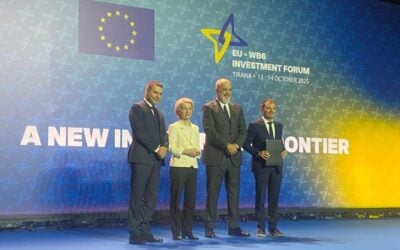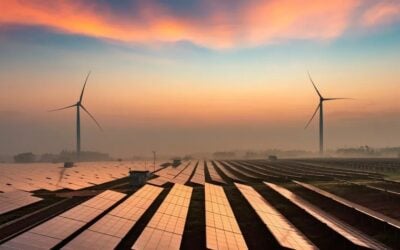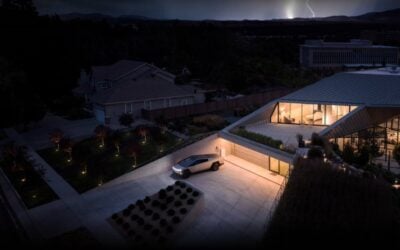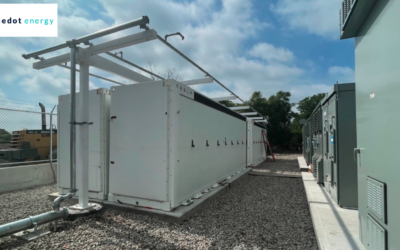Much-circulated artist’s impression of Tesla’s utility-scale storage systems. Image: Tesla.
Tesla boss Elon Musk has claimed that his company is already sold out of stationary storage products for next year before the first ones have even been shipped to customers.
Musk said in an earnings call with analysts on Tuesday that orders for Tesla’s forthcoming Powerwall and Powerpack lithium-ion battery-based energy storage systems have been so high that even if just a “small fraction” of orders placed so far were valid, the company would be sold out “well into 2017”.
Asked if expected revenues were still on track to meet targets of US$3 billion to US$5 billion by 2017 and a margin of 15% on the products, Musk said he was “cautious” about giving “exact estimates” – but said he expected that there would be “very dramatic increases in the stationary storage production”.
The company confirmed that production had begun of stationary storage – branded Tesla Energy – products at its existing factory in Fremont, California. However, it had speeded up its plans to begin manufacturing its battery packs at its Nevada Gigafactory in response to demand, it said in its note to investors summarising activities in the quarter. Due to this it said, “the Gigafactory pull-ahead will push some Tesla Energy Q4 production and deliveries into Q1 [2016]”. Demand had been strong from regions including Germany, South Africa and Australia, the company said.
Try Premium for just $1
- Full premium access for the first month at only $1
- Converts to an annual rate after 30 days unless cancelled
- Cancel anytime during the trial period
Premium Benefits
- Expert industry analysis and interviews
- Digital access to PV Tech Power journal
- Exclusive event discounts
Or get the full Premium subscription right away
Or continue reading this article for free
Chief technical officer JB Straubel said that production of Tesla Energy’s Powerwall and related products had accelerated recently, “quite ahead of plan”, when asked by an analyst about progress towards ramping up at the Gigafactory. Battery cell production is expected to begin at the factory in the second half of next year, with a significant portion of the initial output going towards the Tesla Energy suite of products. Batteries that would be used in cars would come out of the Gigafactory “around 2017” – which Straubel said was on target to meet expectations.
Excitement on Autopilot
Overall, Tesla made losses over the quarter of US$0.58 per basic share, an increase from May, in the immediate wake of the late April launch of Tesla Energy, when the company’s shares lost US$0.36 per basic share. A prediction made last quarter for EVs delivered this year dropped from 50,000-55,000 to 50,000-52,000.
Tesla touted non-GAAP revenues for Q3 of US$1.24 billion, which it pointed out was close to a third higher than the equivalent quarter last year. According to widely-reported predictions from analysts, the loss per share figure was higher than an expected US$0.50, while non-GAAP revenues also missed expectations by US$0.02 billion, with US$1.26 billion expected for the quarter. Tesla also said it would up capital expenditure by investing US$500 million in Q4, meaning total capex for the year would stand at around US$1.7 billion.
Perhaps buoyed by Tesla’s assurances on EV production and the future promise of Tesla Energy, the company’s continued losses appear not to have dented investors’ appetites in the short term. While stock was down 2.54% by the close of trading yesterday, after-hours trading pushed it back up by 7.27%.
However, after the obvious excitement over Powerwall and Powerpack that had accompanied the company’s last two earnings calls, questioning focused more on the company’s EV production targets and tech. The new Autopilot feature for Tesla’s EVs dominated the questioning, with analysts queuing up to ask a range of hypothetical questions on the possibilities it offered.
One interesting moment came as the Tesla execs were asked if they would adapt Autopilot and offer it to fleet providers such as Uber, or whether Tesla might decide to themselves offer an Uber-like service using the new tech. According to a recent interview, Uber’s CEO Travis Kalanik had said that if Tesla’s cars were autonomous by 2020 that he would want to “buy them all” for his app-based service. Musk did not answer, electing to bat the question away, saying it was “an insightful” and “smart” question but that it was “not the right time” to make any announcements one way or the other.
Another big announcement made during the call was the recruitment of a new CFO, with Deepak Ahuja to retire after a handover period. Much was made across US media of the hiring of Google’s Jason Wheeler, who Musk described in the analyst call as having been the second-most senior finance officer at the search engine turned tech-services giant. The announcement adds to the recent “hiring war” between Tesla and Apple, with Musk controversially calling Apple the “Tesla graveyard” – although in reality the corporate headhunting traffic between the two has been a two-way affair. It was revealed recently by an anonymous source in the Wall Street Journal that Apple is itself targeting 2019 for the launch of an EV of its own.
Musk said he had yet to see any “near-term benefit” to EV sales from the “dieselgate” scandal. Image: Tesla.
Dieselgate
Perhaps predictably, questions were asked about the impact of the recent Volkswagen emissions scandal, whereby the German carmaker was found to have falsified test results to make its diesel vehicles appear to be lower emissions vehicles than they actually were. Ryan J Brinkman of JP Morgan Securities asked if Tesla thought the affair would have any impact on demand for EVs.
“I think what one would naturally expect from this is that regulators will no longer turn a blind eye to these things. And so the cost of producing gasoline, diesel cars that actually meet the legal emissions requirements is going to be quite a bit higher. So I would expect the car companies to accelerate their plans for electric vehicles, which is great,” Musk said, adding however that he had not as yet seen any near-term benefit to Tesla from the ‘dieselgate’ scandal.





